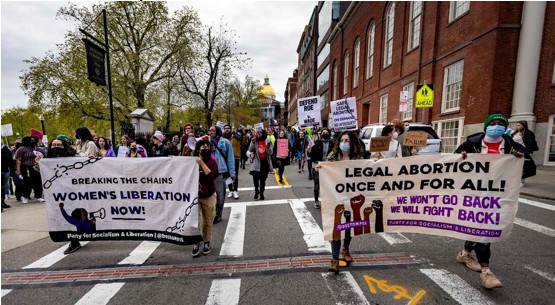Millions of women across the US could soon lose their legal right to abortion, according to a leaked Supreme Court document.
The document, published on Tuesday by Politico, suggests the country’s top court is poised to overturn the 1973 decision that legalized abortion nationwide.
If the court strikes down the Roe v Wade ruling, individual states would be allowed to ban abortion if they wish. It is expected abortion could then be banned in almost half of US states.
The Supreme Court’s justices are expected to issue a ruling in late June or early July. Roe v Wade is in the court’s sights because Mississippi is asking for it to be overturned. The justices heard that case in December.

Protesters marching down Park Street in Boston during the Defend Abortion Rights rally at the Massachusetts State House (Photo: NPR)
Joint List MK Aida Touma-Sliman (Hadash), who heads the Knesset Committee for Advancing the Status of Women, said the ruling would be the most significant step backward in the struggle of women and the feminist movement in the United States in decades.
“The removal of the rights of women to their bodies will first of all harm the weakest women, who will be forced to give birth against their will and receive medical care underground,” she warned. “I hope there will be huge protests that result in the decision being overturned. The same conservative forces who pushed for this decision are trying to advance similar steps here. We cannot let it happen. If an abortion ban like the one in Mississippi becomes law, it will be catastrophic.”
A brief submitted by Human Rights Watch (HRW) together with Amnesty International and the Global Justice center, said that Roe means for human rights: banning abortion would have a significant negative impact on the health of pregnant people. “The worst impact would be on marginalized groups, including people living in economic poverty and young people, and Black, Indigenous, and people of color. These populations already face significant barriers accessing abortion care. In country after country, abortion bans have not decreased the number of abortions, but rather increased unsafe abortions, especially affecting people of limited means.”
According the brief, in countries across the world, including Romania, South Africa, El Salvador, and Ecuador, there is a statistical relationship between restrictive abortion legislation and increases in maternal mortality and morbidity. “Access to safe and lawful abortion services is firmly rooted in the rights to life; to nondiscrimination; to be free from torture and cruel, inhuman, or degrading treatment; and to privacy, among others. These rights are recognized in international human rights treaties ratified by the United States,” HRW said.


